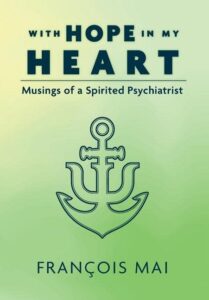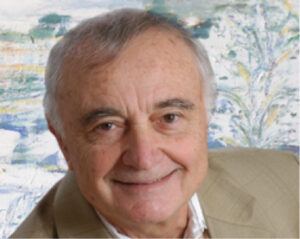Published by Friesen Press, Canada; 2022
Review by Laura Locke
 With Hope in My Heart: Musings of a Spirited Psychiatrist (Friesen Press, Canada; 2022) is a rewarding account of a life filled with remarkable achievements, as well as tragedies, missed opportunities, and many bends in the road. In looking back at his life, author François Mai isn’t afraid to reveal not only his successes, but also, with admirable humility and openness, his faults. He also helps us recognize that it is by facing and admitting our mistakes that we can grow, both personally and as a society. Throughout the twists and turns of his life story, readers get to know his interesting family – including ancestors in his family tree. The many photographs sprinkled throughout the book add more insight. In Mai’s memories and reflections, we are also rewarded with examples of how to live life fully and generously.
With Hope in My Heart: Musings of a Spirited Psychiatrist (Friesen Press, Canada; 2022) is a rewarding account of a life filled with remarkable achievements, as well as tragedies, missed opportunities, and many bends in the road. In looking back at his life, author François Mai isn’t afraid to reveal not only his successes, but also, with admirable humility and openness, his faults. He also helps us recognize that it is by facing and admitting our mistakes that we can grow, both personally and as a society. Throughout the twists and turns of his life story, readers get to know his interesting family – including ancestors in his family tree. The many photographs sprinkled throughout the book add more insight. In Mai’s memories and reflections, we are also rewarded with examples of how to live life fully and generously.
Mai grew up in South Africa during the Apartheid era. As a history buff, I was fascinated by his accounts of South Africa’s early years, the growth and reality of apartheid, and the stormy journey toward becoming the country it is today. Tales of his childhood, and of the beauty of his childhood home, are both enlightening and captivating. Mai also writes in detail about his parents’ immigration from France, and the ongoing issues that this raised for the whole family. We learn about his mother’s talent as a professional musician and how he inherited her love of classical music – and also about his complicated relationship with his father.
Mai became an activist opposing apartheid. He writes, “The illegalities and immorality of apartheid also had a major effect on my career plans and my philosophy. They caused me to identify strongly with the poor and the marginalized in our society, and few are more marginalized than those with chronic psychiatric illness. My experience as an activist in the political maelstrom that was South Africa became a founding factor that influenced my decision to follow a career path in psychiatry.” (pg. 6)
We can see the weaving of many threads coming together, including his Christian faith as a member of the Catholic Church. He grew to believe that hope is an essential tenet of Christianity, and is also an essential ingredient of life. The details of his path to becoming a psychiatrist include many ups and downs, and readers will appreciate his vividly-written stories of the effort, triumphs and disappointments along the way. I also enjoyed Mai’s description of the history of psychiatry, with stories of many of the colourful characters who were part of that history.
One bright light at the beginning of his medical education was his courtship of a pretty young nurse, Sarie, who became his wife. Mai earned his medical degree in 1956 at the University of Cape Town and completed psychiatric residencies in England and Scotland, plus a 12-month fellowship in New York. Mai and his family moved to Canada in 1972, where he continues to reside. His career stretched over fifty years, and throughout his life Mai has also enjoyed cycling and swimming, as well as playing piano and organ. In the latter part of the book, he eloquently describes the joys and challenges of his retirement years.

Dr. François Mai
In the book, Mai is not afraid to write about his aversion to some tenets of the Catholic Church, nor is he averse to criticizing the field of psychiatry, especially in the area of diagnostic classification systems. He also has harsh words for some of the actions of the pharmaceutical industry. However, we also read about his admiration and respect for many figures throughout the history of psychiatry, as well as snapshots of his own personal mentors and many friends who touched his life. As well, Mai goes into loving detail about life with his adventurous and patient wife and their four sons.
I also appreciated his thoughts on spirituality, such as this passage about the aftermath of the death of their two-month-old son, Paul, of SIDS in 1965:
“Suffering has meaning only if it is placed in a spiritual context. God has allowed suffering because there is evil in the world. He has allowed the evil, not created it. Evil and suffering test us, and there can be ultimate benefit or reward through spiritual growth, maturation, or heavenly repose. Christ gave us his example by his awful death on the Cross: “Forgive them, Lord, for they know not what they do.” I believe it is not possible to understand pain and evil without giving them a spiritual dimension. As Paul Bunyan said in The Pilgrim’s Progress, “In times of affliction we commonly meet with the sweetest experiences of the love of God.” These factors, and the promise of meeting Paul again in the afterlife, enabled me to come to terms with the hurt and bereft feeling of his death. It was an acid test of my faith.” (pg. 117)
Written from the heart, this book is indeed a gift of hope.
—
François Mai is also the author of Diagnosing Genius: The Life and Death of Beethoven (McGill/Queen’s University Press, 2007) and the novel Father, Unknown, set during and after the French Revolution (Austin Macauley Publishers, 2017). Since 1966, he has written 115 articles, the majority in peer-reviewed medical journals.
Visit François Mai’s website.
Photo of François Mai by Marilyn Mikkelsen.







